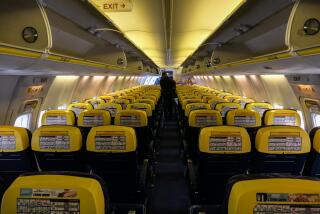Scouting the World for the Wheelchair Traveler : Although travel options are increasing, it’s still important to use a tour operator who knows the details of checking ahead.
- Share via
Since 1979, Dr. Michael Quigley figures he has visited 96 countries and boarded about 100 cruise ships. The fact that he travels by wheelchair does not seem to slow him down.
Wheelchair travel has become easier over the past decade, according to Quigley, an adjunct professor of epidemiology and rehabilitative medicine at the University of Texas Health Sciences Center, Dallas. Quigley is also an outspoken proponent of disabled rights who lost the use of his legs as a result of a Vietnam War injury.
Nationwide, several travel agencies and organizations now specialize in arranging trips for travelers in wheelchairs, with destinations ranging from sedate land tours to scuba diving/safari packages. Some services custom design trips for solo travelers or small groups, making certain that accommodations will be accessible. (Many organizers of the trips are themselves in wheelchairs or have family members who are.) Wheelchair travelers who take advantage of such specialized services and who follow common-sense precautions can minimize difficulties, experts say.
“We just sent eight people to Hawaii for three weeks,” said Howard McCoy, who owns Accessible Journeys (215-521-0339) in Ridley Park, Pa. “They needed accessible condos and attractions. Half were in chairs; half were spouses and friends.” Right now McCoy is setting up a wheelchair-accessible trip through the Amazon. He believes it will be the first such ground-access tour for wheelchair users.
Wheelchair travelers “want more exotic locations as their awareness increases (that travel is possible),” said Edna Cook, director of Flying Wheels Tours (800-535- 6790) in Owatonna, Minn. “We just had a party come back from Vietnam.”
For those who are into physical adventure experiences, Michelle Galler, vice president of the Handicapped Scuba Assn., leads scuba diving trips to South Africa, the Florida Keys and other locales. “The only things that stop someone (who uses a wheelchair) from diving are lung problems and seizures,” said Galler, who uses a wheelchair. In November, she will lead a scuba-safari expedition to South Africa. (For information, contact her at Jefferson Travel in Lakewood, Colo., 303-933-4864.)
Some travel agents have found a market for individual and small group trips, rather than large tours. “Young people (in wheelchairs), especially, want to go when and where they want,” says Lois Bonanni, director of accessible tours for Directions Unlimited in Bedford Hills, N.Y. (800-533- 5343). She asks specific questions about a wheelchair user’s needs before booking car and van rentals and accommodations. “Travelers with paraplegia may only need a car with hand controls, for example,” said Bonanni, while those with paralysis of upper and lower limbs might need a van with a lift.
Before Yvonne and Lou Nau offer a tour through their Tarzana-based Nautilus Tours (818-343- 6339), they travel to the site themselves. Upcoming offerings include a tour to Ireland and England in September and another to Australia and New Zealand in October. The Naus travel the entire route first, checking out hotels and attractions. Are the doorways wide enough? Can wheelchairs fit easily under the rooms’ bathroom sinks? Are different levels joined by ramps or elevators?
The Naus, post-polio patients who themselves use wheelchairs, learned their lesson on taking someone else’s word for accessibility. “We went to Scandinavia in 1986 without checking it out first,” she said. “Almost no hotel was accessible. They all said they were.”
But things are getting better, Yvonne said. She recalled a trip her husband took alone to Fiji in 1977. When his plane landed, he had to wait to be carried from the second floor jetway to the ground level because there was no elevator. “He talked to the airport manager about the need for an elevator,” Yvonne Nau said. But when the couple returned to Fiji in 1983, there, waiting, was an elevator. “We felt as if we had something to do with it,” she said.
Little by little, most countries are becoming more accessible to wheelchair travelers, said Betty Hoffman, owner of Evergreen Travel (800-435-2288) in Lynnwood, Wash., who has been in the business of working with wheelchair-bound travelers for the past 35 years. “Canada is ahead of the U.S., in terms of accessibility,” she said. “In Europe, Copenhagen is one of the most accessible locations, although Norway and Sweden are coming along.” England, Switzerland and Germany are also improving and least accessible is Italy, she said, but it is getting better, too.
Wheelchair users can do much on their own to ease travel, Quigley contends. Taking along tools for chair repair can help. “Take extra inner tubes for your tires. Take extra screws and special screwdrivers (for repairing the chair). If you get in trouble on the road, don’t go to a hospital or wheelchair supply store for repair. The best place to go is a bicycle shop.”
Quigley blew both tires on his wheelchair while visiting the Great Wall of China. He had only one spare. While he was trying to figure out what to do, help arrived, via bicycle. “Some Chinese guys on bikes came by and repaired the other one,” he said.
Wheelchair travelers making their own travel arrangements can improve the chances of accessibility by asking a variety of questions about accommodations before reserving a hotel or motel, suggests Dr. Stuart Rose in his book, “International Travel Health Guide.”
Among the questions:
* Is there a handicapped parking area?
* Is valet parking available?
* Is a portable ramp available?
* Do elevator doors open at least 32 inches wide?
* Are there special rooms for handicapped guests?
Before enlisting the help of a specialized travel agency, Quigley tells wheelchair travelers to ask for references. “Ask how long the company has been setting up specialized tours,” he said.
More to Read
Sign up for The Wild
We’ll help you find the best places to hike, bike and run, as well as the perfect silent spots for meditation and yoga.
You may occasionally receive promotional content from the Los Angeles Times.






